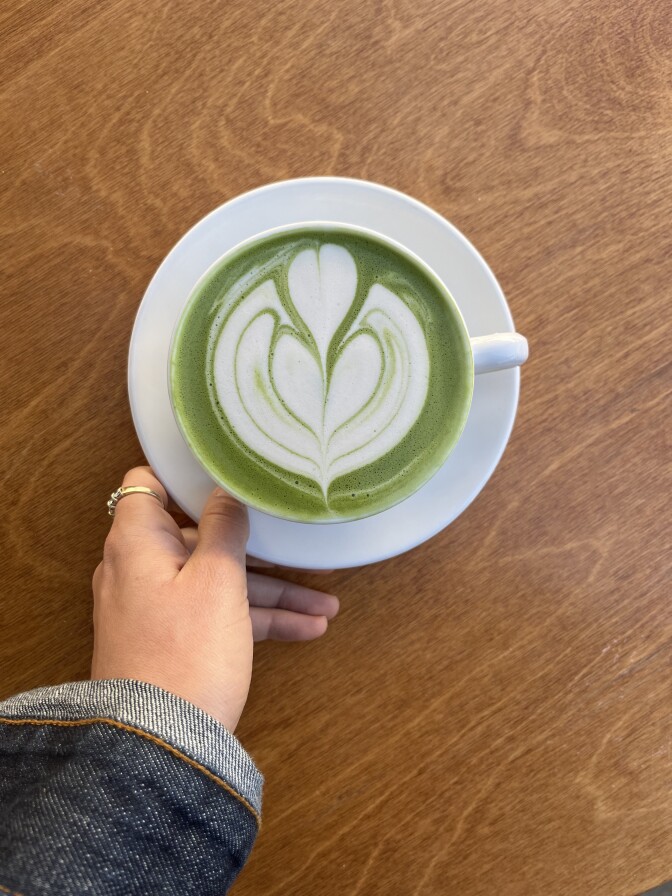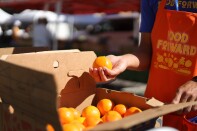Here in L.A., matcha is finally getting its flowers in lattes, tonics, and einspanners concoctions, offered up at eateries across the city.
But matcha isn’t just a one note brew. It can be light, ultrarich, bold, dessert-y, depending on where it’s from. So what makes a satiating sip for you may not be someone else’s cup of tea.
Rocky Xu, founder of Rocky’s Matcha whose traveling tea house began as L.A. pop-ups, says it’s comparable to coffee and wine.
“With coffee you have the explosion of single origins and tasting menus,” he says. "With wines, they are aged, cheap, expensive, and everything in between. With matcha, there’s so many different levels.”
So, where should the matcha lover begin? First, know thy source. Cafes choose the matcha they carry. Most traditional matcha comes from Uji in Japan, where the region’s subtropical climate and soil conditions produce high quality leaves. But tea cultivation practices have spread across Japan and other Asian countries, like Korea, which means there are other flavor profiles to consider.
Cafes shortcut this by buying from specific, reputable brands, which you’ll see popping up fairly often, like Rocky’s, Marukyu Koyamaen, Kanbayashi Shunsho, Ippodo, and Mizuba Tea Co.
What else should you be looking out for? Xu boils it down to this checklist:
On the label
- First harvest — Ceremonial grade. Cultivated once a year at the beginning of the harvest known as “first flush.” A first harvest matcha will have the most intense and fresh flavor.
- Stone mill — Machine milled matcha is the most efficient, but it can overheat the leaf, causing astringency. Stone milled matcha avoids that problem, but it can only be produced in finite amounts, somewhere between 25 to 50 grams per stone mill per hour.
In your drink
- Color — The more vibrant the green, the fresher the flavor, and the more likely a ceremonial grade. A more yellowish, dull hue indicates tea has had more time to oxidize and is from a later harvest, leading to less flavor and nutrients.
- Flavor — a good sip should have a natural sweetness and non-bitter umami. If a cafe serves their matcha pre-sweetened, they’re most likely serving a lower, culinary grade. Pre-mixed sugar is added to mask the bitterness of a later harvest, signaling a lower quality.
Now that we’ve debriefed, here are seven places to get started with your new knowledge:
Stereoscope Coffee (various locations)
Carrier of three Mizuba Tea Co., Stereoscope exclusives.

Stereoscope is a coffee chain which takes its matcha very seriously. They use matcha from Mizuba Tea Company, a Portland-based brand found in cafes across the states that directly sources from producers on Uji farms in Japan.
Stereoscope, however, has partnered with Mizuba to create three store exclusives – Nakama, Kurohitsuji, and Uchigawa. Eunice Noh, one of their baristas, explains the difference:
- Nakama — “For everyday. A full bodied matcha, bold with comforting notes.”
- Kurohitsuji — “A clean and crisp matcha that is more delicate.”
- Uchigawa — “The highest grade carried in the store that’s the most complex, naturally sweet and slightly floral.”
Simply put: as you go down the list, there's more umami flavor with less aftertaste — and increasingly higher prices. I’d say that enthusiasts with a developed palette can probably taste the differences, but I’ll stick to my Nakama with oat milk for the consistent richness I look for in my tea.
Location: Echo Park, Buena Park, Hollywood, Newport Beach, Long Beach
Hours: Changes per location
Tea Master of Little Tokyo (Little Tokyo)
Carrier of Tea Master Matcha Powder plus a changing variety on the shelves.
In the Honda Plaza, family-owned Tea Master of Little Tokyo is an authentic Japanese counter serving soft-serve matcha ice cream, green teas and smoothies. While they don’t do the kistchy drinks, they stick to a traditional tea program, traveling to farms in Yame and Shizuoka regions to research where their tea leaves are sourced.
In the Honda Plaza, family-owned Tea Master of Little Tokyo is a Japanese counter serving matcha green teas, smoothies and soft-serve matcha ice cream. Their matcha comes from the Yame and Shizuoka regions, known for producing matcha which is milder and vegetal.
There’s nothing commercial about this space; its charm comes from its shelves of traditional teaware, or chasens (Japanese tea whisks), handwritten signage and Japanese paintings, signaling a deep appreciation for the art of tea making. Wood paneled and minimal in design, it’s not so much a space to camp out to work as to take time to savor a traditional cup of tea.
I appreciate Tea Master’s stripped back approach and often end up there when I’m buying tea-making equipment for home. I trust its selection.
Location: 450 E 2nd St.
Hours: Wednesday through Thursday, Noon to 7 p.m.; Friday through Saturday, Noon to 8 p.m; Sunday Noon to 5 p.m. Closed Monday and Tuesday
Café Telegrama (Melrose Hill)

Of the many Rocky’s carriers in Los Angeles, my snaps go to Café Telegrama for keeping their latte simple and consistent: hot or iced, with a choice of milk (oat, Koatji, (fermented rice) or pistachio). Telegrama’s latte is served in a sizable glass, making for a crucial sidekick for chowing down on their ricotta and blueberry compote pancakes.
Location: 737 N. Western Ave., Los Angeles
Hours: Daily, 8 a.m. - 3 p.m.
Modu (Highland Park)

Modu, in Korean, means “all”, which extends to their choice of brands: for their green matcha they work with Dado Tea, a Korean tea company with roots in the tea province of Jeolla.
“There definitely was a draw to support a fellow Korean brand,” says chef owner Jiyoon Jang. But she notes that she still mostly sources from Japanese matcha farms in Uji “since that's where the best of the best is."
"Quality is one of our most important values," she said, "so we keep that at the forefront in any partnership we decide on.”
Jang uses Dado’s Okumidori Ceremonial Single Origin for their matcha and Kettl’s Shirakawa for their hojicha, which is dark with rich chocolatey notes. In a latte over Koatji milk, the flavors are balanced and light
Location: 5805 York Blvd.
Hours: Wednesday through Friday, 7 a.m. to 3 p.m.; Saturday through Sunday, 8 a.m. to 4 p.m.
Closed Monday and Tuesdays
Mandarin Coffee Stand (Pasadena)
Carrier of Kurasu Kyoto and AYR Matcha Black

Mandarin Coffee Stand is located in Pasadena’s Burlington Arcade, nestled into the European-style architectural gem with looming archways and curved windows. If you’re craving choice, Mandarin has many great options, from classic green through roasted hojicha.
I mainly endure the lines for their black tea matcha from Korea’s Jeju Island. It’s a powder tea with floral yet chocolatey notes, and it’s hard to come by in a matcha elsewhere. I find the amount of caffeine is just right.
Location: 380 S. Lake Ave. #111
Hours: Daily, 8 a.m. to 4 p.m.
Maru Coffee (Arts District, Los Feliz)
Carrier of Ippodo Matcha
Maru Coffee has created its own cafe culture, one of style and taste in both cafegoers’ fits and their choice in caffeine kick. Maru’s uses Ippodo Tea for their drinks, a matcha that’s been stone milled in Kyoto since 1717. Their latte offers a deep green, energy boost which turns into a sweet treat when paired with the cafe’s signature “cream top”.
**Matcha not available at the espresso-only Beverly Hills location
Locations:
Arts District: 1019 S Santa Fe Ave.
Los Feliz: 1936 Hillhurst Ave.
Hours: Los Feliz: Monday to Saturday, 7 a.m. to 5 p.m.; Sunday, 8 a.m. to 5 p.m.Arts District: Monday to Friday, 7.30 a.m. to 5 p.m.; Saturday to Sunday, 8 a.m. to 5 p.m.
Stagger Coffee (Koreatown)
Carrier of Leigh Leaf

Only three months old, word is traveling fast about Stagger Coffee’s best-selling Double Matcha. It features a ceremonial-grade tea from Japan, a made-in-house vanilla syrup, choice of milk, and sealed by a layer of their signature matcha cream, that is paradise for connoisseurs who just can’t get enough of the rich tea flavor. While you’re at it, try their house-made Jasmine milk tea and double espresso “Donut Latte.”
Location: 3069 1/2 W. 8th St.
Hours: Monday to Friday 8 a.m. - 4 p.m.; Saturday and Sunday 8 a.m. to 5 p.m.











